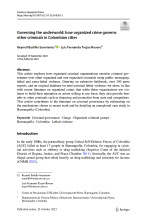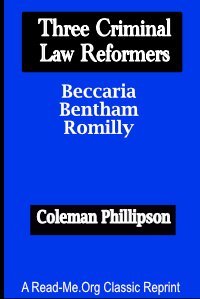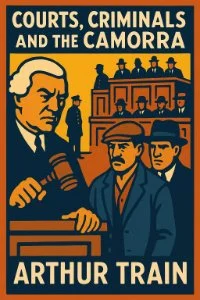By Arthur Train.
by Arthur Train (Author), Colin Heston (Introduction) Format: Kindle Edition
Arthur Train’s Courts, Criminals and the Camorra (1912) arrives from a moment when the American courtroom was transforming from a dusty forum of local justice into a national spectacle. Crime reporting surged, public fascination with underworld societies ripened, and the newly consolidated profession of the district attorney—Train’s own calling—stood at the intersection of drama and civic responsibility. Few chroniclers were better positioned to capture this world than Train himself: lawyer, storyteller, and one of the most influential interpreters of everyday justice in the early twentieth century.
This book offers a vivid, almost cinematic tour through the people and pressures that shaped the criminal courts of Train’s New York. With a wit sharpened by long service in the district attorney’s office, Train narrates cases, misadventures, and courtroom characters with the briskness of a magazine correspondent and the subtle insight of someone who has lived the system from the inside. He makes the courthouse feel less like a bureaucratic maze and more like a bustling social laboratory—part theater, part battleground, part human comedy.
The title’s reference to the Camorra, the Neapolitan criminal society that briefly dominated headlines in the years preceding publication, allows Train to broaden his canvas. The Camorra trials in Europe—particularly the sensational proceedings in Viterbo (1911–12)—were international news, and Americans consumed tales of conspiracy, vendetta, and secret brotherhoods with a mixture of horror and fascination. Train uses these stories not merely to thrill, but to show how crime everywhere reflects its environment: local culture shapes criminal enterprise just as surely as it shapes courts, policing, and political life.
What makes this volume enduring is Train’s tone—bright, conversational, humane. His criminals are rarely monsters; they are people caught in pressures of poverty, opportunity, folly, or ambition. His courts, for all their flaws, are animated by men and women doing their best under imperfect circumstances. The result is a portrait of justice as a living organism, not an abstract ideal.
More than a century later, these essays feel surprisingly fresh. They remind us that the tensions surrounding criminal justice—media sensationalism, public fear, the allure of organized crime, the frustrations of overburdened courts—are not uniquely modern. The debates that animate today’s legal and political discussions echo those Arthur Train captured with humor and clarity in 1912.
To read Courts, Criminals and the Camorra now is to eavesdrop on the origins of our contemporary legal culture. It is also simply to enjoy a gifted storyteller at work, illuminating the world he knew best with charm, color, and a sharp eye for the human quirks that make justice both necessary and endlessly fascinating.
New York Scribner’s (1912) 256 pages. Read-Me.Org Inc. 2025. 173p.












